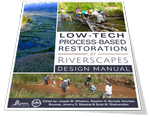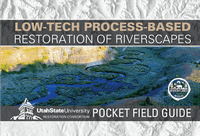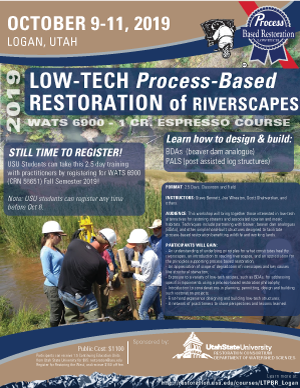Short Course: Introduction to Low-Tech Process-Based Restoration of Riverscapes
October 9–11, 2019, at Utah State University's Logan Campus
This publicly offered short course, hosted by the Utah State University Restoration Consortium, brought together partners interested in low-tech alternatives for restoring streams and associated riparian and mesic habitats to benefit wildlife and working lands.
Over 2.5 days, participants were introduced to the principles underlying low-tech process-based restoration of riverscapes, including planning, design, and construction of cost-effective, low-risk techniques. Topics covered included partnering with beaver, beaver dam analogues (BDAs), post-assisted log structures (PALS), and other simple hand-built structures to facilitate process-based restoration.
Already registered? See logistics
Click here for registration information
Course Materials
Slides & Handouts
Workshop Textbooks
The workshop uses the freely available Design Manual and Pocket Guide. As part of the workshop fee, a hard copy was provided. Extra print copies of the manual are available for around $60 on Amazon or BookBaby, and the pocket guide can be printed as needed.

- Wheaton J.M., Bennett S.N., Bouwes, N., Maestas J.D., Shahverdian S.M. (Eds). 2019. Low-Tech Process-Based Restoration of Riverscapes: Design Manual (Version 1.0). Utah State University Restoration Consortium. DOI: 10.13140/RG.2.2.19590.63049/2

- Wheaton JM, Wheaton A, Maestas J, Bennett S, Bouwes N, Shahverdian S, Camp R, Jordan C, Macfarlane W, Portugal E, Weber N. 2019. Low-Tech Process-Based Restoration of Riverscapes: Pocket Field Guide. DOI: 10.13140/RG.2.2.28222.13123/1
Instruction Team
-
Stephen N. Bennett
Ecologist, Adjunct Professor
ResearchGate -
Nicolaas Bouwes
Aquatic Ecologist, Adjunct Professor
ResearchGate -
Joseph Wheaton
Associate Professor, Ecogeomorphologist
ResearchGate -
Jay Wilde
Rancher and Land Owner -
Chris Jordan
ResearchGate -
Brad Johnson
Palouse CD Staff
Instructor Affiliations
| # | Organization |
|---|---|
| 1 | Utah State University, Watershed Sciences |
| 2 | Anabranch Solutions |
| 3 | Eco-Logical Research |
| 4 | NOAA Fisheries, Northwest Fisheries Science Center |
| 5 | Palouse Conservation District |

